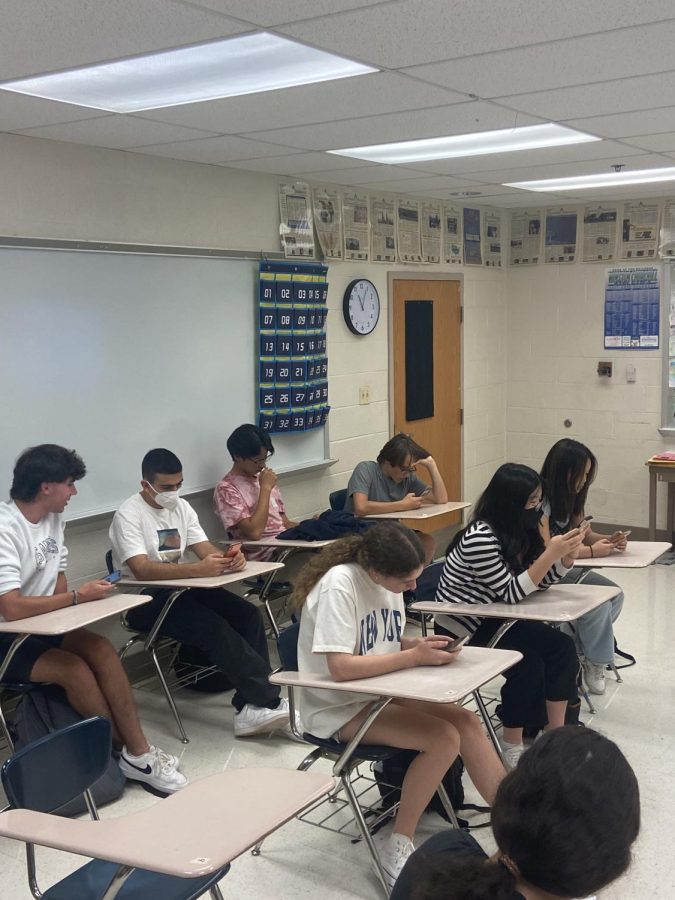New PMD policy sends mixed waves throughout WCHS
WCHS students are seen sitting on their phones in class during free time. Under the new PMD policy, students are not permitted to use their phones during class time at all.
October 20, 2022
As the 2022-23 school year kicked off, students quickly pointed out the new policies implemented by MCPS to address and solve past issues regarding the usage of phones or other personal electronic devices. But, it was clear from the get-go that the new policy implemented by Montgomery County Public Schools was not a crowd favorite. Introduced at all four town hall meetings on the first day of school, the Personal Mobile Device (PMD) policy was met with audible groans from students.
The new plan, aimed at cauterizing phone usage in class, was met with initial confusion and frustration from many students. Students are first given a warning, and then their device can be confiscated or sent to security based on what the teacher says. WCHS senior Isaac Horn was shocked that this drastic change was made so quickly.
“I was a little surprised by the zero tolerance for phones in class because last school year, the county seemed to be much less harsh on enforcing a no phone policy in class,” Horn said. “I was very opposed to how strict the PMD policy is.”
For teachers, PMDs have long been a distraction and an obstacle in their teaching, especially during virtual learning and the return to in-person instruction last year. The constant monitoring of students can distract teachers from their lesson content and other classroom tasks. WCHS science teacher James Fishman believes this policy was a much-needed boost for teachers. According to TMC news, 95% of students bring their phones to class every day. 92% use them to text in class, and even 10% admitted to having texted during an exam.
“I thought [the policy] was well overdue because the past several years I have found easily five to 10 students with phones out each period every day,” Fishman said. “It is easy to see how having a cell phone on you reduces your attention span by a significant amount.”
The policy prohibits use of any PMD during class time. A change from last year, teachers can not let their students use PMDs at all. WCHS senior Alec Lehtman is one of many students who was originally opposed to this idea.
“When I have downtime in class I feel like I should be able to communicate with my friends and family,” Lehtman said. “I also don’t like how in the case of an emergency, we don’t have immediate access to our phones.”
Although seemingly inconvenient, the PMD policy aids teachers in areas in addition to keeping students focused. Cheating, copying of assignments and other forms of academic dishonesty have decreased so far this year.
“Last year was especially bad, and I was having many students continue to pull out their phones even after there were consequences,” Fishman said. “Having only chromebooks will also reduce some of the academic dishonesty I saw last year on a couple of my assessments.”
A month after the PMD policy was implemented, students began to realize it may not be as bad as they initially thought. Students such as Horn and Lehtman have noticed an improvement in their focus and less overall distraction.
“I have noticed that I have been a little more focused in class due to the PMD policy,” Horn said. “Compared to last school year, I am taking more thorough notes and participating more in my classes without having the availability of using my phone.”
With students on board, teachers have had an easier time teaching the material and relating to students. The results speak for themselves. Teachers have found students get better grades and stay more focused.
“I have definitely seen better attention from all of my students, and far less confusion by students about our classwork and homework,” Fishman said. “I was also expecting to see some “withdrawal” symptoms by students, but fortunately, I have seen very little evidence of that.”
For now, the PMD policy has proven to be a success. It has been observed in limiting interruption and academic dishonesty, with also an improvement in focus and productivity among students. For students who aren’t reaping the benefits or still struggle to keep their phones away, there are methods to help.
“If you are struggling to keep your phone away during class, shut your phone all the way off,” Lehtman said. “That way, you have to go through the effort of turning it back on and by that time it’s not worth it.”



